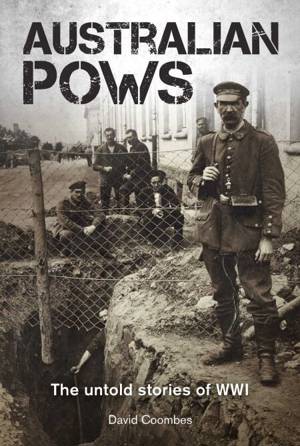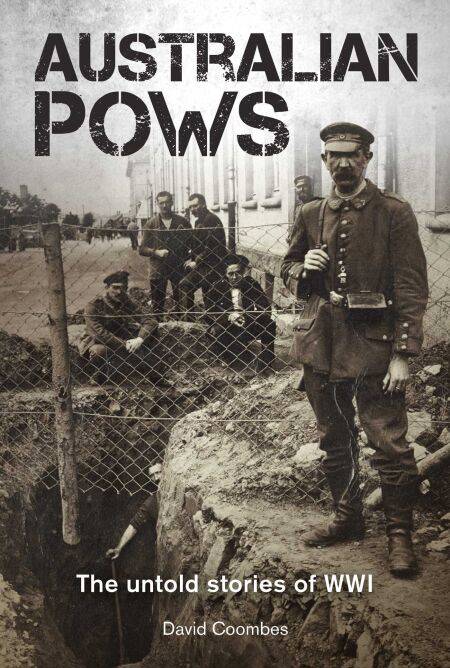
En raison d'une grêve chez bpost, votre commande pourrait être retardée. Vous avez besoin d’un livre rapidement ? Nos magasins vous accueillent à bras ouverts !
- Retrait gratuit dans votre magasin Club
- 7.000.000 titres dans notre catalogue
- Payer en toute sécurité
- Toujours un magasin près de chez vous
En raison de la grêve chez bpost, votre commande pourrait être retardée. Vous avez besoin d’un livre rapidement ? Nos magasins vous accueillent à bras ouverts !
- Retrait gratuit dans votre magasin Club
- 7.000.0000 titres dans notre catalogue
- Payer en toute sécurité
- Toujours un magasin près de chez vous
Description
“Comrades in distress we were, and it was now that one felt the existence of a brotherhood that establishes itself in circumstances of this kind … A few of the men are very dejected, and appear to be losing all interest in themselves, their habits and practices not being approved by the majority. In some cases, for the most miserable reward, they cringe to the Germans for the chance of being of some service; others also, despite the fact their bodies can ill-afford the sacrifice, trade their boots and other clothing in exchange for food and smokes … This is regrettable, but censure has no effect on the few. Most of us have resolved to maintain some sort of dignity, though ’tis difficult.”
So wrote Australian prisoner of war (POW) Corporal Lancelot Davies who was captured at the First Battle of Bullecourt on 11 April 1917 where Allied forces were ‘badly smashed up’. Davies was one of almost 1,200 Australians captured that day, facing an uncertain future at the hands of their German captors. – he described the future as ‘blank’ and unpredictable.
The experiences of Australian prisoners of war (POWs) or Kriegsgefangeners held captive in Germany has been largely forgotten or ignored – overshadowed by the horrid stories of Australians imprisoned by the Japanese during World War Two. Yet, as David Coombes makes known, the stories are interesting and significant – not only providing an account of what those young Australian soldiers experienced, and the spirit they showed in responding to captivity – but also for the insight it provides into Germany in the last eighteen months of the war.
Coombes draws upon previous inaccessible records – including the interviews conducted many years before by Chalk – as well as private papers and unpublished manuscripts. He paints a vivid picture of young soldiers who survived the trauma of battle, only to find themselves facing an unknown fate at the hands of an often vindictive and cruel enemy. These ‘comrades in distress’, many wounded and traumatised by trench warfare, quickly discovered the bond of brotherhood, often the key to survival in a harsh environment with little food, poor medical treatment, back-breaking work and the anguish of confinement.
What emerges in the pages of this amazingly detailed account is the typical Australian sense of humour and the sheer will to live that marked these men. Above all, it was their determination to be free and to return once more to their families that ensured their survival; often against overwhelming odds.
Crossing the Wire is a fitting tribute to the World War One soldiers and POWs. David Coombes highlights the ordeals these men went through, their stoicism in enduring their mistreatment, and the fearlessness of a few in launching ingenious attempts to escape. He proves beyond doubt that their stories are by no means less compelling than those of their World War II brothers.
So wrote Australian prisoner of war (POW) Corporal Lancelot Davies who was captured at the First Battle of Bullecourt on 11 April 1917 where Allied forces were ‘badly smashed up’. Davies was one of almost 1,200 Australians captured that day, facing an uncertain future at the hands of their German captors. – he described the future as ‘blank’ and unpredictable.
The experiences of Australian prisoners of war (POWs) or Kriegsgefangeners held captive in Germany has been largely forgotten or ignored – overshadowed by the horrid stories of Australians imprisoned by the Japanese during World War Two. Yet, as David Coombes makes known, the stories are interesting and significant – not only providing an account of what those young Australian soldiers experienced, and the spirit they showed in responding to captivity – but also for the insight it provides into Germany in the last eighteen months of the war.
Coombes draws upon previous inaccessible records – including the interviews conducted many years before by Chalk – as well as private papers and unpublished manuscripts. He paints a vivid picture of young soldiers who survived the trauma of battle, only to find themselves facing an unknown fate at the hands of an often vindictive and cruel enemy. These ‘comrades in distress’, many wounded and traumatised by trench warfare, quickly discovered the bond of brotherhood, often the key to survival in a harsh environment with little food, poor medical treatment, back-breaking work and the anguish of confinement.
What emerges in the pages of this amazingly detailed account is the typical Australian sense of humour and the sheer will to live that marked these men. Above all, it was their determination to be free and to return once more to their families that ensured their survival; often against overwhelming odds.
Crossing the Wire is a fitting tribute to the World War One soldiers and POWs. David Coombes highlights the ordeals these men went through, their stoicism in enduring their mistreatment, and the fearlessness of a few in launching ingenious attempts to escape. He proves beyond doubt that their stories are by no means less compelling than those of their World War II brothers.
Spécifications
Parties prenantes
- Auteur(s) :
- Editeur:
Contenu
- Nombre de pages :
- 416
- Langue:
- Anglais
Caractéristiques
- EAN:
- 9781922387783
- Date de parution :
- 02-02-21
- Format:
- Ebook
- Protection digitale:
- Adobe DRM
- Format numérique:
- ePub

Les avis
Nous publions uniquement les avis qui respectent les conditions requises. Consultez nos conditions pour les avis.






